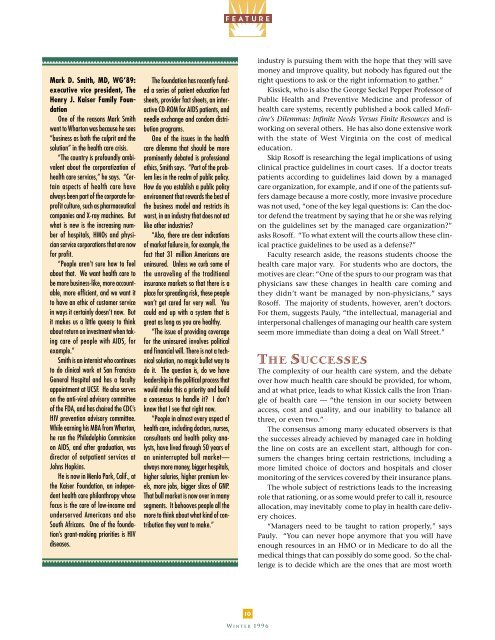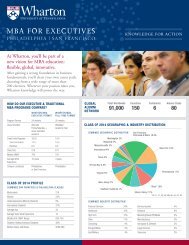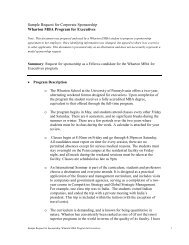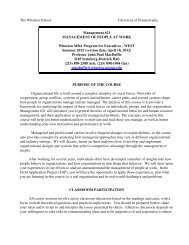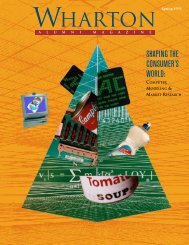wharton's prescription for health care - Wharton Magazine
wharton's prescription for health care - Wharton Magazine
wharton's prescription for health care - Wharton Magazine
Create successful ePaper yourself
Turn your PDF publications into a flip-book with our unique Google optimized e-Paper software.
FEATUREMark D. Smith, MD, WG’89:executive vice president, TheHenry J. Kaiser Family FoundationOne of the reasons Mark Smithwent to <strong>Wharton</strong> was because he sees“business as both the culprit and thesolution” in the <strong>health</strong> <strong>care</strong> crisis.“The country is profoundly ambivalentabout the corporatization of<strong>health</strong> <strong>care</strong> services,” he says. “Certainaspects of <strong>health</strong> <strong>care</strong> havealways been part of the corporate <strong>for</strong>profitculture, such as pharmaceuticalcompanies and X-ray machines. Butwhat is new is the increasing numberof hospitals, HMOs and physicianservice corporations that are now<strong>for</strong> profit.“People aren’t sure how to feelabout that. We want <strong>health</strong> <strong>care</strong> tobe more business-like, more accountable,more efficient, and we want itto have an ethic of customer servicein ways it certainly doesn’t now. Butit makes us a little queasy to thinkabout return on investment when taking<strong>care</strong> of people with AIDS, <strong>for</strong>example.”Smith is an internist who continuesto do clinical work at San FranciscoGeneral Hospital and has a facultyappointment at UCSF. He also serveson the anti-viral advisory committeeof the FDA, and has chaired the CDC’sHIV prevention advisory committee.While earning his MBA from <strong>Wharton</strong>,he ran the Philadelphia Commissionon AIDS, and after graduation, wasdirector of outpatient services atJohns Hopkins.He is now in Menlo Park, Calif., atthe Kaiser Foundation, an independent<strong>health</strong> <strong>care</strong> philanthropy whosefocus is the <strong>care</strong> of low-income andunderserved Americans and alsoSouth Africans. One of the foundation’sgrant-making priorities is HIVdiseases.The foundation has recently fundeda series of patient education factsheets, provider fact sheets, an interactiveCD-ROM <strong>for</strong> AIDS patients, andneedle exchange and condom distributionprograms.One of the issues in the <strong>health</strong><strong>care</strong> dilemma that should be moreprominently debated is professionalethics, Smith says. “Part of the problemlies in the realm of public policy.How do you establish a public policyenvironment that rewards the best ofthe business model and restricts itsworst, in an industry that does not actlike other industries?“Also, there are clear indicationsof market failure in, <strong>for</strong> example, thefact that 31 million Americans areuninsured. Unless we curb some ofthe unraveling of the traditionalinsurance markets so that there is aplace <strong>for</strong> spreading risk, these peoplewon’t get <strong>care</strong>d <strong>for</strong> very well. Youcould end up with a system that isgreat as long as you are <strong>health</strong>y.“The issue of providing coverage<strong>for</strong> the uninsured involves politicaland financial will. There is not a technicalsolution, no magic bullet way todo it. The question is, do we haveleadership in the political process thatwould make this a priority and builda consensus to handle it? I don’tknow that I see that right now.“People in almost every aspect of<strong>health</strong> <strong>care</strong>, including doctors, nurses,consultants and <strong>health</strong> policy analysts,have lived through 50 years ofan uninterrupted bull market—always more money, bigger hospitals,higher salaries, higher premium levels,more jobs, bigger slices of GNP.That bull market is now over in manysegments. It behooves people all themore to think about what kind of contributionthey want to make.”industry is pursuing them with the hope that they will savemoney and improve quality, but nobody has figured out theright questions to ask or the right in<strong>for</strong>mation to gather.”Kissick, who is also the George Seckel Pepper Professor ofPublic Health and Preventive Medicine and professor of<strong>health</strong> <strong>care</strong> systems, recently published a book called Medicine’sDilemmas: Infinite Needs Versus Finite Resources and isworking on several others. He has also done extensive workwith the state of West Virginia on the cost of medicaleducation.Skip Rosoff is researching the legal implications of usingclinical practice guidelines in court cases. If a doctor treatspatients according to guidelines laid down by a managed<strong>care</strong> organization, <strong>for</strong> example, and if one of the patients suffersdamage because a more costly, more invasive procedurewas not used, “one of the key legal questions is: Can the doctordefend the treatment by saying that he or she was relyingon the guidelines set by the managed <strong>care</strong> organization?”asks Rosoff. “To what extent will the courts allow these clinicalpractice guidelines to be used as a defense?”Faculty research aside, the reasons students choose the<strong>health</strong> <strong>care</strong> major vary. For students who are doctors, themotives are clear: “One of the spurs to our program was thatphysicians saw these changes in <strong>health</strong> <strong>care</strong> coming andthey didn’t want be managed by non-physicians,” saysRosoff. The majority of students, however, aren’t doctors.For them, suggests Pauly, “the intellectual, managerial andinterpersonal challenges of managing our <strong>health</strong> <strong>care</strong> systemseem more immediate than doing a deal on Wall Street.”T HE SUCCESSESThe complexity of our <strong>health</strong> <strong>care</strong> system, and the debateover how much <strong>health</strong> <strong>care</strong> should be provided, <strong>for</strong> whom,and at what price, leads to what Kissick calls the Iron Triangleof <strong>health</strong> <strong>care</strong> — “the tension in our society betweenaccess, cost and quality, and our inability to balance allthree, or even two.”The consensus among many educated observers is thatthe successes already achieved by managed <strong>care</strong> in holdingthe line on costs are an excellent start, although <strong>for</strong> consumersthe changes bring certain restrictions, including amore limited choice of doctors and hospitals and closermonitoring of the services covered by their insurance plans.The whole subject of restrictions leads to the increasingrole that rationing, or as some would prefer to call it, resourceallocation, may inevitably come to play in <strong>health</strong> <strong>care</strong> deliverychoices.“Managers need to be taught to ration properly,” saysPauly. “You can never hope anymore that you will haveenough resources in an HMO or in Medi<strong>care</strong> to do all themedical things that can possibly do some good. So the challengeis to decide which are the ones that are most worth10W INTER 1996


